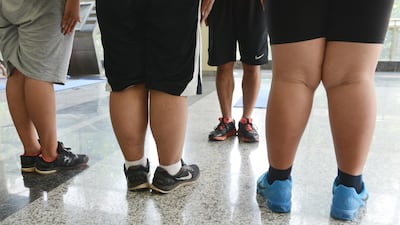By the time you read this, most of us will have already broken our new year resolutions. Whatever vows we may have made to ourselves or to our friends and family to give up smoking, take up exercise or be more considerate will probably have been torn asunder within hours of the new year arriving. Only one in ten resolutions made in the final days of last year will be kept in 2018, with the vast majority of us returning sheepishly to our bad habits soon after vowing to be better. So why do we do it?
That is a question that will no doubt cross Kevin Hackett's mind over the next few weeks. Our lifestyle writer has vowed to do the "unthinkable" and get fit. He won't be alone, but for those who can't face the prospect of turning up for an exercise class, the example of Gerson Castaneda might prove interesting. As The National reported, Mr Castaneda was overweight and unable to walk for prolonged periods when he moved to Abu Dhabi from overseas three years ago. Over time, he has shed 20kg and now works out most days of the week. He credits his transformation to hours spent walking on a treadmill. His story highlights how seemingly gentle exercise can, in the long-term, yield significant results.
Tackling obesity is a long-term struggle in a country where our comfortable lifestyles often corral us into sedentary ways. A 2012 study placed the UAE as the fifth most obese country in the world. A 2016 Ras Al Khaimah study found that 40 per cent of schoolchildren are overweight, 24.4 per cent are obese and 5.7 per cent are morbidly, or extremely, obese. The numbers are conclusive.
To turn the tide we should consider walking a little more this year, particularly at this time of year when the weather is much cooler. Even a short walk around your neighbourhood can improve your health and well-being. While it may be an exaggeration to stay every step counts, it is certainly the case that a new year resolution to “walk more” and, perhaps, to “eat less” could bring substantial dividends.

